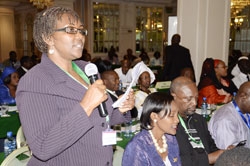Political parties from the region have expressed the need for the East African Legislative Assembly (EALA) members to be voted for by universal suffrage, and not by Members of Parliament of a partner state.The request is among several resolutions that representatives of political parties came up with during a two-day consultative meeting of political parties in East Africa that took place in Nairobi last week.


Political parties from the region have expressed the need for the East African Legislative Assembly (EALA) members to be voted for by universal suffrage, and not by Members of Parliament of a partner state.
The request is among several resolutions that representatives of political parties came up with during a two-day consultative meeting of political parties in East Africa that took place in Nairobi last week.
"There is need to consider the direct election of members of EALA through universal suffrage, as this would enhance representation and accountability and there is need to share and build a resource base on information on the integration process and to popularise the EAC,” reads the resolutions which were circulated to media houses yesterday.
Currently, EALA legislators are voted into the regional parliament by their respective parliaments in all the five EAC partner states.
The meeting, which also suggested the political federation ambition should undergo a referendum, aimed at promoting dialogue and shared understanding of their role in the EAC political integration process.
"It was further recommended that this process should involve public education and awareness up to the grassroots levels. A wide stakeholder approach should be employed during the sensitisation, awareness and civic education process,” the resolution reads in part.
As a way of measuring the performance of political parties across the region, the over 200 participants recommended that an annual award for the best performing political party be given as an incentive.
They proposed that indicators for the tool be drawn from the pillars of the draft protocol on good governance, which is yet to be adopted, as well as adherence to constitutions, and rules and regulations of the parties.
Ends


